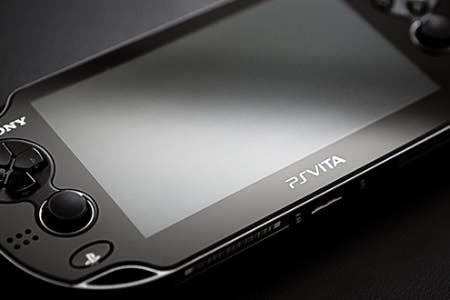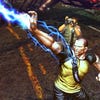Saturday Soapbox: Vita signs of life
It's still performing miserably at retail, but Sony's handheld is delivering games worth celebrating.
Do you remember the NGP? No, not what was once Sony's PSP successor but SNK's Neo Geo Pocket, a brilliant handheld that went largely unnoticed in its all-too-brief lifespan just over ten years ago. It had pretty much everything - hardware to die for with what was, and remains to this day, one of the finest d-pads ever to grace a console, and a software catalogue that, while short on big hitters, was home to some delightfully offbeat gems.
There was one of the best Sonic spin-offs, some surprisingly competent 2D fighter de-makes such as Capcom vs. SNK and Last Blade, and what's arguably one of the greatest handheld games ever, Card Fighters Clash. With its hardcore credentials and cult back catalogue, it was in many ways the portable Dreamcast - which is quite fitting, really, given its ability to connect to Sega's much-loved console.
And like the Dreamcast, it was sadly ill-fated - launched as the Pokemon craze was sending off Nintendo's original Game Boy in flamboyant style, it was well and truly killed off by the arrival of the comparatively super-powered Game Boy Advance. Its failure hasn't really dimmed its charm though; alongside the miraculously small Game Boy Micro it is, for my money, one of the best handhelds ever released.
Actually, come to think of it, do you remember the NGP? Before it was known as the Vita, Sony's handheld was a pocket-sized monolith of promise - a portable device that could deliver console style gaming on the move, and one that flew in the face of the common sense that suggested that such a machine couldn't prosper amongst the mob of mobile phones.
That common sense has won out, sadly, and the Vita's life to date has been fairly miserable. Understandably under-supported by bricks-and-mortar retailers who are being undercut considerably by Sony's digital store, its split-level approach to its games likely hasn't done it any favours. It's hard to get much of a sense how well the Vita's games are doing via download, but it's fairly safe to say that the physical ones are performing shockingly badly.
The hardware's doing little better. Sales predictions for PSP and Vita have shrunk, first from 16 million to 12 million in August and, more recently from 12 million down to 10 million. In Japan, one of the few places where it's possible to get any transparency on the number of units sold, the Vita recently endured its weakest week - a mere 5806 were sold for the week ending October 28, a figure that's soundly eclipsed by the 14541 PSP sales and absolutely crushed by the 3DS and 3DS XL's combined sales of 61,632.
It's a tough, tough situation that the Vita finds itself in, and early thoughts that Sony was simply witnessing the same teething problems that the 3DS went through in its first year seem sadly wide of the mark. It's going to take a lot more than a price cut to turn around the unit's fortunes - in fact, right now, the Vita looks beyond salvation.
But you know what? Screw business models, screw hardware sales and absolutely screw common sense - let's talk about the games, because in that regard Sony's Vita has done a job that's totally worthy of praise. In the months since launch, it's delivered some of the defining moments of my gaming year to date: Virtua Tennis 4 was something of an unsung masterwork that got lost in the launch stampede, and even Unit 13, which could have been a by the numbers third-person shooter, was touched with a certain class.
It has, in WipEout 2048 and the subsequent HD and Fury track-packs, a fittingly beautiful swansong for one of the racing genre's greatest series, and of course for one of its greatest studios. It has, in Lumines Electronic Symphony and the recently released Super Crate Box, got the definitive version of two of my favourite portable games of all time. It's got indie darlings like Sound Shapes and Retro City Rampage, and it's got slithers of classic Japanese creativity in Jet Set Radio as well as the more contemporary examples like Gravity Rush. Hell, in LittleBigPlanet Vita it's got what for me is the definitive version of Sony's now flagship series.
It has the means to play the first three Metal Gear Solids as well as an emulation of Peace Walker that's enhanced by the ability to use the second analogue stick, and thanks to the PSP back-catalogue it's also a pretty comprehensive retro-gaming powerhouse. With Vagrant Story, Tactics Ogre and Final Fantasy Tactics, my own unit has become something of a Yasumi Matsuno gallery, and all three of those games absolutely sing on the Vita's sparkling OLED screen.
None of that's been enough to halt the Vita's decline into expensive obscurity, and it's meant that what should have been a banner couple of weeks for the Vita is slipping by without any real fanfare. Street Fighter X Tekken and Need for Speed: Most Wanted, released within a week of each other, are proof that the handheld could deliver faithful ports of full-blooded home console games, and they're both remarkable experiences in their own right. Assassin's Creed 3: Liberation, meanwhile, is a slightly different flavour of the grand console game on the move.
Judged by release schedule alone, you'd likely come to the conclusion that the Vita's got the upper hand on Nintendo's 3DS, which with only Paper Mario, Professor Layton and New Super Mario Bros. 2 to boast looks comparatively paltry. They're games with incredibly broad appeal, though, and Sony's almost single-minded pursuit of the hardcore audience has cost it dearly.
But right now, that hardcore should embrace the Vita, and celebrate its many, many positive traits. This is a wonderful console with a slowly growing catalogue of wonderful games, and we should all enjoy it while it lasts - however long that'll be. The Vita's starting to earn its place alongside the Neo Geo Pocket as one of my favourite handheld devices - and it deserves a much more gracious fate than SNK's doomed console.




